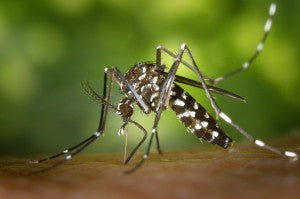
After another unusually warm winter here in the US (actually the sixth warmest ever recorded in US history), the National Pest Management Association is expecting a major infestation of ticks and mosquitoes for spring and summer. A bitter cold in the winter months helps to kill these buggers off, however, that did not happen. The predicted warm and wet spring is only going to make matters worse - it's time to put some serious effort into protecting your horse from mosquitoes and ticks
Mosquitoes and ticks can carry a number of infectious diseases for humans and animals. Since your horses are outside, you will want to do your best to protect them from these pesky bugs. Protecting Your Horse from Mosquitoes and Ticks can prove to be quite the challenge, so here are some helpful hints to protect your four legged friends:
- Land upkeep - Keep your farm groomed by mowing pastures, trimming back bushy areas, removing any wood piles, etc. These areas attract ticks and other animals that could be the host for ticks.
- Barn upkeep - Make sure your horse constantly has clean, fresh water in a clean bucket or trough. Do not allow water buckets or troughs to go un-emptied for a long period of time as this is a breeding ground for mosquitoes. Be sure to drain or eliminate standing or stagnant water around your horses.
- Avoid night-time turnout - To avoid mosquitoes, try to stay away from night-time turnout for your horses. If you do turn out at night, make sure your horse is protected as best as possible with a fly sheet, insect spray, etc.
- Spray/fog the barn - Spray or fog your barn with approved insecticides designed to kill mosquitoes and ticks. Make sure these insecticides are safe around horses!
- Chickens or guinea hens - If the tick population around your barn is bad, consider getting chickens or guinea hens. These birds are specifically known for their tick-eating appetites.
There is no perfect tick or mosquito repellant. However, all of these things done in conjunction with one another can greatly reduce the tick and mosquito population around you which will help to protect your horse.
Read more about essential oils as a flea and tick repellent here.
For more information on the tick and mosquito infestation this summer, click
HERE.
 After another unusually warm winter here in the US (actually the sixth warmest ever recorded in US history), the National Pest Management Association is expecting a major infestation of ticks and mosquitoes for spring and summer. A bitter cold in the winter months helps to kill these buggers off, however, that did not happen. The predicted warm and wet spring is only going to make matters worse - it's time to put some serious effort into protecting your horse from mosquitoes and ticks
Mosquitoes and ticks can carry a number of infectious diseases for humans and animals. Since your horses are outside, you will want to do your best to protect them from these pesky bugs. Protecting Your Horse from Mosquitoes and Ticks can prove to be quite the challenge, so here are some helpful hints to protect your four legged friends:
After another unusually warm winter here in the US (actually the sixth warmest ever recorded in US history), the National Pest Management Association is expecting a major infestation of ticks and mosquitoes for spring and summer. A bitter cold in the winter months helps to kill these buggers off, however, that did not happen. The predicted warm and wet spring is only going to make matters worse - it's time to put some serious effort into protecting your horse from mosquitoes and ticks
Mosquitoes and ticks can carry a number of infectious diseases for humans and animals. Since your horses are outside, you will want to do your best to protect them from these pesky bugs. Protecting Your Horse from Mosquitoes and Ticks can prove to be quite the challenge, so here are some helpful hints to protect your four legged friends:


